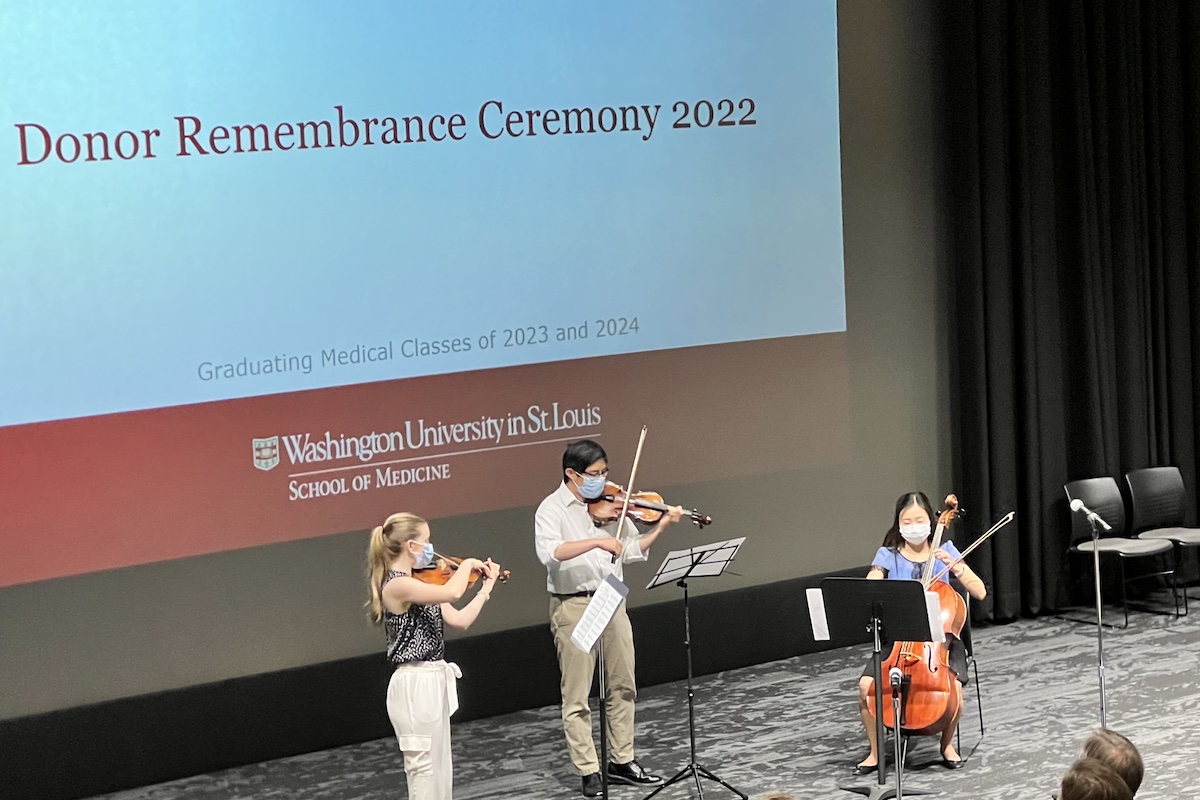One of a medical student’s most powerful teachers inspires compassion, forgives mistakes and leaves an indelible impression that forever guides that student’s clinical care and research, all without ever saying a word.
That silent teacher is also a student’s first patient. At Washington University School of Medicine in St. Louis, they meet during first-year anatomy class.
These patient-teachers are the bodies of people who decided while still alive to donate their bodies to advance medical education and biomedical research.
“The first time I met my donor was the day I remember most from medical school, because it marked my journey to becoming a doctor,” said Kushi Mallikarjun, an upcoming fourth-year student who plans to pursue radiology. “I remember being struck with immense gratitude for my donor, and I continue to feel gratitude every day for lessons I learned from my silent teacher and first patient.”
On June 16, Mallikarjun joined about 200 of his peers from the Classes of 2023 and 2024 in honoring the lives of 400 donors. Along with students and faculty, loved ones of the deceased visited the Eric P. Newman Education Center on the Medical Campus for the Donor Remembrance Ceremony. The event included personal reflections, poetry, and musical performances that preceded a reverent reading of donor names and the lighting of battery-operated candles.
Other loved ones joined the ceremony from across the globe via livestream.
“Each ceremony is special, but this one is the first after a two-year pause due to COVID-19,” said Mallikarjun, who served as one of the ceremony’s leaders, along with soon-to-be third-year student Yuliya Kozina. “Many of the families here today share the tragedy of grieving their loved one during a pandemic, a time when gathering with others to grieve may not have been possible. We are grateful for the opportunity to be here today with you to celebrate your loved ones.
“Like the donors, our students are also from all over the country and the world,” Mallikarjun said. “Students from the Class of 2024 share the experience of beginning their education in the midst of COVID, when most of their lessons were online. As a class, they came together for the first time in the anatomy lab. Students from the Class of 2023 fondly remember anatomy lab as one of their last experiences before dispersing because of the pandemic. All students have immensely benefited from the experience of learning from their donors.”
During the ceremony, students carried to the stage vases filled with 400 flowers, each representing a donor. The colors of the flowers were symbolic: Red represented continued love; yellow and pink, joy; blue, gratitude; and white, remembrance.
“Those you loved will live on in the future acts of healing by our medical students,” said Thomas M. De Fer, MD, a professor of medicine and associate dean of medical student education, to the donors’ families and friends. “This is an occasion for gratitude, immense gratitude.”
Veronica Belko attended the ceremony in honor of her husband of 46 years, Alexander Belko, who died at age 72 on June 11, 2019, of acute myeloid leukemia. She was accompanied by Alexander’s children and 14-year-old grandson, Isaac Weible.
“He was funny and nice, and I miss him every day,” Isaac said.
“To acknowledge his life like this is very meaningful,” Veronica Belko said. “He never met a stranger, and he lived a full life.”
Veronica met Alexander while working in a St. Louis-area factory that made piston rings for cars. Her mother introduced them and came to consider Alexander a son. He served in the Vietnam War as a mechanic in the 25th Infantry Division. Throughout the years, he also worked as a carpenter and millwright. He helped raise three children and eight grandchildren.
“He’d drop everything to help his family or friends,” recalled his son, Rich Weible. “His desire to help is why he wanted to donate his body. He underwent so many treatments for cancer and hoped his body would shed light on treating cancer so people wouldn’t have to suffer years from now.”
The university’s Body Donor Program, coordinated through the Department of Neuroscience, has helped provide thousands of cadavers to medical students, resident physicians, clinical fellows and other trainees to gain in-depth understanding of human anatomy.
“In addition to learning the anatomy of the human body, students gain a profound sense of humility through the selfless gift of the donors,” said Amy Bauernfeind, PhD, the program’s director, vice chair of education and an associate professor in the Department of Neuroscience. “The students are taught to treat all patients as human-beings first, and that process begins with their anatomy donors.”
Kozina, who co-led the ceremony and read aloud the donors’ names, called the emotional connection she formed with her donor life-changing. “I felt the importance of my donor being my first patient,” she said. “I had a responsibility to him. This person had trusted me to honor his selfless gift by being the best student I could be. I realized quickly that while my donor was my first patient, he was also one of my greatest teachers. I have carried this forward for every patient interaction since. We learn the most medicine from our patients, and I imagine this will continue to be true throughout my career.”

Source: Read Full Article
